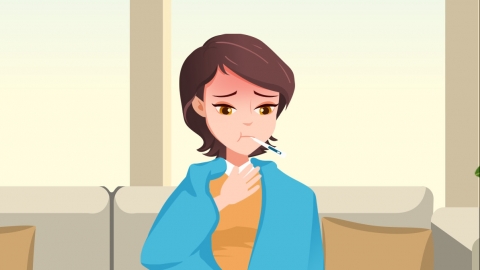What are the reasons why air conditioning makes it difficult to recover from a cold?
Generally, it may be difficult for a cold caused by air conditioning to heal due to significant temperature differences between indoor and outdoor environments, dry air, continuous virus proliferation, concurrent allergic rhinitis, secondary bacterial infections, and other related factors. It is recommended to seek timely medical attention, identify the underlying cause, and undergo symptomatic treatment under a doctor's guidance. Detailed explanations are as follows:

1. Significant indoor-outdoor temperature differences: If the temperature in an air-conditioned room is too low and there is a large temperature difference compared to the outside, moving between these environments can disrupt the body's temperature regulation, causing recurring cold symptoms, worsening nasal congestion and runny nose, and prolonging recovery time. Adjust the air conditioner to maintain a room temperature of 24–26°C, ensure the indoor-outdoor temperature difference does not exceed 7°C, and allow time to adapt to transitional areas before entering or leaving the air-conditioned room, thus minimizing temperature fluctuations and physical discomfort.
2. Dry air: While operating, air conditioners remove moisture from the indoor air, causing dryness that leads to dry nasal and respiratory mucous membranes, weakening their defense functions, making it easier for cold viruses to invade, and making symptoms difficult to relieve, often accompanied by dry throat and coughing. Place a humidifier in the air-conditioned room to maintain humidity at 50%–60%, drink plenty of water to stay hydrated, and use normal saline to rinse the nasal cavity to keep mucous membranes moist and enhance protective capabilities.
3. Continuous virus proliferation: Failure to clean the air conditioner filter in a timely manner can lead to dust and virus accumulation. The air blown from the unit may carry viruses, repeatedly irritating the respiratory tract, causing persistent cold symptoms, accompanied by ongoing nasal congestion and low-grade fever. Clean the air conditioner filter regularly, and open windows periodically while using the air conditioner to ventilate and reduce indoor virus concentration, preventing repeated infections.
4. Concurrent allergic rhinitis: Dust mites and mold in air conditioners can trigger allergic rhinitis, which may overlap with cold symptoms, causing worsened nasal congestion and runny nose, often mistaken as an unresolved cold, accompanied by nasal itching and sneezing, with symptoms worsening after exposure to air-conditioned airflow. Regularly clean the air conditioner and indoor environment to reduce allergens, and follow medical advice to use anti-allergy medications such as budesonide nasal spray, loratadine tablets, and montelukast sodium tablets to alleviate rhinitis symptoms and prevent confusion with a cold that could delay treatment.
5. Secondary bacterial infection: In an air-conditioned environment, a slow cold recovery and persistently weakened immunity can easily lead to secondary bacterial infections, presenting as increased cough with purulent sputum and worsening sore throat, with blood tests indicating bacterial infection requiring anti-infective treatment. Patients should ensure adequate rest and nutrition, follow medical advice to use antibiotics such as amoxicillin capsules, cefuroxime axetil tablets, and azithromycin dispersible tablets for anti-infective treatment, and avoid direct exposure to cold air blowing onto the body to reduce respiratory irritation.
When using air conditioners daily, avoid keeping doors and windows closed for extended periods; regularly ventilate to maintain fresh indoor air. Do not allow the air conditioner's airflow to directly blow onto the head or body, especially during sleep, when proper warmth preservation and covering with blankets are necessary. During a cold, reduce the time spent in air-conditioned rooms and engage in appropriate outdoor activities in warm environments to enhance physical resistance and promote recovery from the cold.










